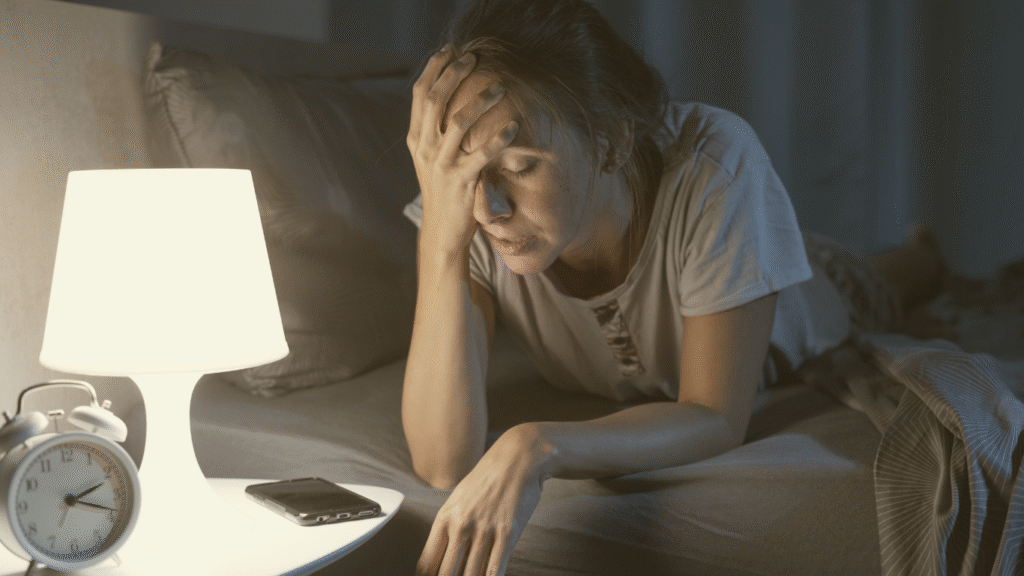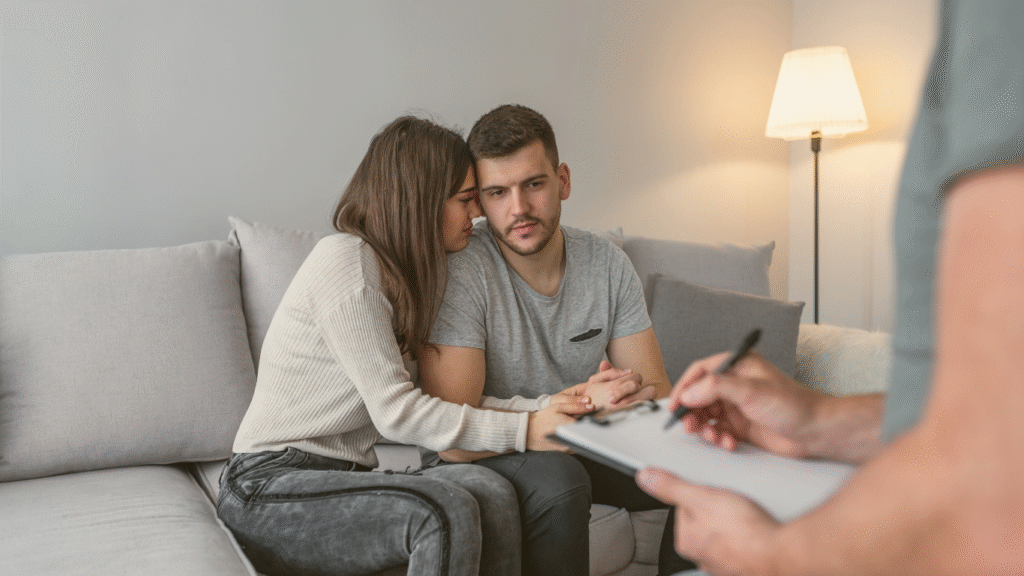Ambien Addiction Treatment in Atlanta, GA

Ambien addiction affects thousands of people in Atlanta who struggle with sleep disorders. Studies show that patients taking zolpidem (Ambien) often develop physical and psychological dependence, even when following prescribed dosages.
MARR Treatment Centers’ ambien addiction treatment in Atlanta, GA, includes intensive outpatient programs (IOP), partial hospitalization programs (PHP), and ongoing therapy – with success rates reaching 70% for those who complete our comprehensive programs.
Many people start taking Ambien legally for insomnia but find themselves needing higher doses as tolerance builds. What begins as a prescribed treatment can quickly evolve into dependency, with some people experiencing withdrawal symptoms when trying to stop.
The signs of Ambien addiction include memory problems, coordination issues, and continuing to take the drug despite negative consequences.
MARR Treatment Centers offer specialized treatment options from caring clinicians who understand the unique challenges of Ambien dependency. We provide personalized care plans that address both the physical addiction and any underlying sleep disorders. We work closely with our clients to safely manage withdrawal symptoms while developing healthy sleep habits.
Make MARR Treatment Centers Your Home
Our clients find their recovery journey is unique from the start. We have a therapeutic community with high accountability among participants. It’s a longer-term commitment, lasting 98 days.
We approach the therapeutic community from the standpoint of it being a combination of a partial hospitalization program (PHP), intensive outpatient program (IOP), and lodging. However, it’s a much higher structure than a typical sober living program.
Participants must follow rules to be fully immersed in the program. Starting out, they don’t get cars, cell phones, or other luxuries that can lead to distraction. The participants can petition for privileges after the initial, highly structured first six weeks.
Our Therapeutic Community’s Philosophy and Values
Our community fosters recovery through strong relationships and the belief in individual change. The communal environment promotes trust, accountability, and self-discipline. The therapeutic community model emphasizes these core values:
- Taking responsibility for one’s recovery.
- Learning and growing through shared experiences with peers.
- Utilizing the community as the primary catalyst for positive change, offering mutual support and healthy challenges.
- Providing comprehensive care for the whole person through various therapies, counseling, responsibilities, and activities.
Understanding Ambien Addiction and Dependence
Ambien (zolpidem) creates both physical and psychological dependence through its effects on brain chemistry. Studies show prescription drug dependence requires careful medical monitoring and treatment.
The Science of Ambien Dependence
Zolpidem affects sleep receptors in the brain, leading to tolerance over time. Users need increasing doses to achieve the same sleep-inducing effects.
Physical dependence develops as the body adapts to regular Ambien use. When someone stops taking the medication, they may experience withdrawal symptoms like:
- Rebound insomnia
- Anxiety and restlessness
- Tremors
- Elevated heart rate
- Sweating
The risk of addiction increases with higher doses and longer use. Research indicates Ambien has significant abuse potential as a sedative-hypnotic medication.
Psychological and Emotional Impact
Many people begin taking Ambien for legitimate insomnia treatment but develop psychological dependence. This creates a cycle of relying on the medication to sleep.
Common emotional effects include:
- Fear of sleeping without medication
- Anxiety about running out
- Preoccupation with obtaining more
- Using Ambien to cope with stress
Mental health symptoms like depression and anxiety often worsen during Ambien dependence. Some users experience memory problems and confusion from long-term use.
Breaking free from psychological dependence requires addressing underlying sleep issues and developing healthy coping skills. Professional treatment helps manage both the physical and emotional aspects of recovery.

Ambien Withdrawal and Detoxification
Stopping Ambien use can lead to physical and psychological symptoms that require professional medical care. Safe detoxification helps manage withdrawal symptoms and reduce health risks.
Symptoms of Ambien Withdrawal
Withdrawal symptoms from zolpidem (Ambien) can start within 48 hours of the last dose.
Common physical symptoms include:
- Tremors and shaking
- Sweating
- Nausea
- Racing heart rate
- Muscle cramps
Mental and emotional symptoms often include:
- Severe anxiety
- Panic attacks
- Memory problems
- Confusion
- Mood swings
Sleep-related symptoms are challenging:
- Rebound insomnia
- Vivid dreams
- Night sweats
- Sleep pattern disruption

Our Treatment Programs
We offer a range of treatment programs designed to meet you where you are on your journey to well-being. Each program is tailored to address specific needs and provide the proper support for lasting recovery and growth.
Partial Hospitalization Program
A partial hospitalization program (PHP), sometimes called Day Treatment, is a structured mental health treatment program that operates several hours a day, multiple days per week, typically within a hospital or clinic setting.
It’s designed for individuals who need more intensive support than traditional outpatient therapy but don’t require 24/7 inpatient care.
Here’s a breakdown of key aspects:
- Level of Care: PHP bridges the gap between outpatient and inpatient care. It offers more intensive support than weekly therapy sessions but allows individuals to return home each evening.
- Structure and Schedule: Programs usually run for a significant portion of the day (e.g., 6-8 hours), several days a week (e.g., 3-5 days). This structured schedule provides a consistent and supportive environment.
Intensive Outpatient Program
An intensive outpatient program (IOP) is a structured mental health or substance use treatment program that provides a higher level of care than traditional outpatient therapy but doesn’t require overnight stays in a hospital or residential facility.
This outpatient treatment is designed for individuals who need more support and structure than weekly therapy sessions offer but can still function independently in their daily lives.
Here’s a detailed explanation:
- Level of Care: IOPs sit between regular outpatient rehab and partial hospitalization programs (PHPs) or inpatient care. They offer more intensive treatment than standard outpatient services but allow individuals to live at home and maintain some level of independence.
- Structure and Schedule: IOPs typically involve attending group and individual therapy sessions several days a week for a few hours daily. A common schedule might be three days a week for three hours each day, but this can vary.
Our Treatment Services
Our programs typically include a combination of therapeutic interventions, such as:
- Group Therapy: Facilitated discussions and activities with other individuals facing similar challenges.
- Individual Therapy: One-on-one sessions with a therapist to address specific needs and goals.
- Medication Management: A psychiatrist or psychiatric nurse practitioner monitors and adjusts medication regimens.
- Psychoeducation: Educational sessions on mental health conditions, coping skills, and relapse prevention.
- Family Therapy: Involving family members in the treatment process to improve communication and support.
- Experiential Therapies: Activities such as art therapy, music therapy, or recreational therapy to promote emotional expression and healing.
Frequently Asked Questions
Getting proper medical care and support is essential for successfully overcoming Ambien dependency. Treatment plans combine medical supervision, therapy, and ongoing support systems to address both the physical and psychological aspects of recovery.
What are the first steps in seeking treatment for Ambien dependency?
The initial step involves scheduling an evaluation with a qualified healthcare provider who can assess the severity of Ambien use and create a personalized treatment plan.
Medical professionals will review current medication use, sleep patterns, and overall health status to determine the safest approach to discontinuation.
A comprehensive medical assessment helps identify any underlying health conditions or concurrent substance use that could affect treatment.
What withdrawal symptoms can one expect during Ambien detoxification?
Common withdrawal symptoms include rebound insomnia, anxiety, irritability, and mood changes. These symptoms typically begin within 48 hours of stopping Ambien.
Physical symptoms may include sweating, tremors, and mild nausea. Most acute withdrawal effects peak within the first week.
Supervision during medical detox ensures safety and comfort through careful monitoring and appropriate supportive care.
Are there any specific therapies recommended for those struggling with zolpidem addiction?
Cognitive Behavioral Therapy (CBT) helps identify and change thoughts and behaviors related to sleep and medication use.
Sleep hygiene education teaches natural methods to improve sleep quality without medication dependence.
Group therapy provides a supportive environment where individuals can share experiences and coping strategies with others facing similar challenges.
How can one manage cravings and avoid relapse after Ambien discontinuation?
Developing healthy sleep routines and stress management techniques helps reduce the urge to return to medication use.
Regular exercise, meditation, and relaxation practices support natural sleep patterns.
Creating a strong support network of family, friends, and healthcare providers helps maintain long-term recovery success.
What support groups are available for individuals recovering from sleep aid addiction?
Narcotics Anonymous and other 12-step programs offer regular meetings and community support throughout Georgia.
Local hospitals and treatment centers host recovery groups specifically focused on prescription medication dependency.
Online support communities provide 24/7 access to encouragement and resources for those in recovery.
What role do medical professionals play in the rehabilitation from Ambien abuse?
Doctors monitor physical health and progress throughout treatment, adjusting care plans as needed.
Psychiatrists and counselors address underlying mental health concerns that may have contributed to medication dependence.
Healthcare providers coordinate with other treatment team members to ensure comprehensive care and prevent complications during recovery.
Join a Treatment Program Today
If you’re concerned about yourself or a loved one struggling with substance abuse, reaching out is the first step towards hope. Our comprehensive drug rehab programs are designed to foster lasting addiction recovery and overall wellness. Please don’t wait to help them reclaim your life.
Call us today at 678-884-4080 to speak to an addiction specialist and learn more about our personalized treatment options and how we can support your loved one’s journey to a healthier future.
